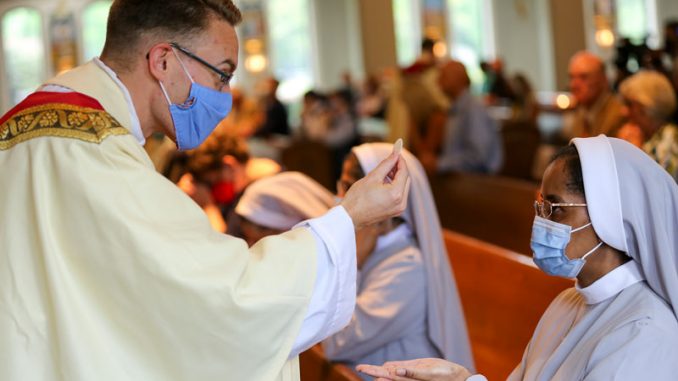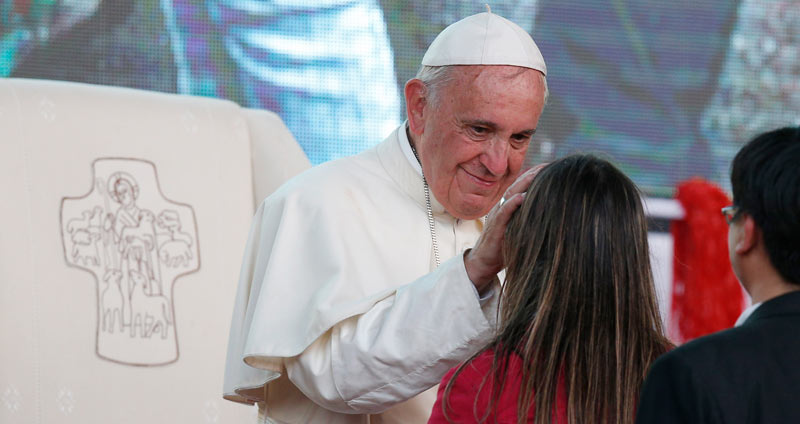
As the Catholic Church begins the process of restoring public worship as the COVID-19 crisis continues, priests and lay faithful are facing unique challenges that do not always have clear answers. Does communion on the tongue present a greater risk than receiving in the hand? Do ministers of Holy Communion have a right to deny communion on the tongue? Should the faithful, during a global health crisis, insist on receiving communion on the tongue if they are told to receive in the hand, and if so, does that constitute the sin of disobedience?
At first glance, it may appear that those distributing Holy Communion may have the right to refuse to administer Holy Communion on the tongue, especially during a health crisis. Cardinal Sarah, Prefect of the Congregation for Divine Worship, reminded us, “In times of difficulty (e.g., wars, pandemics), Bishops and Episcopal Conferences can give provisional norms which must be obeyed. Obedience safeguards the treasure entrusted to the Church. The measures . . . expire when the situation returns to normal.” Note that exactly what these norms are is not spelled out, giving latitude to bishops and episcopal conferences in times of calamity.
Chapter IX of the General Instruction of the Roman Missal explains that some adaptations to the liturgy are permissible to the diocesan ordinary, and those are listed. Other adaptations may be proposed by the episcopal conference and approved by the Apostolic See. Does this apply to refusing to administer Communion to people on the tongue?
While it may not be the statistical norm in our parishes, the normative practice of all of the rites of the Church is communion on the tongue. This is obvious because the only other way to receive is in the hand, which requires a special permission called an indult. And indult by its very nature is an exception to the norm, and one that can be take away by competent authority. Only the Holy See can regulate this particular liturgical norm, and the Holy See has not made clear that bishops, much less priests or extraordinary ministers, have the competence to derogate from this norm.
In an interview with Riccardo Cascioli on 2 May 2020, the Prefect of the Congregation for Divine Worship, the dicastery of the Apostolic See which does have universal competency over this question, stated, “There is already a rule in the church and this must be respected. The faithful are free to receive Communion in the mouth or hand.”[1] It follows that, if the faithful are free to receive Communion in the mouth or on the hand according to the norms of the Missale Romanum 2000, then the person distributing does not have a right to require communion on the hand.
Now, some would say that the right of the faithful to receive Communion on the tongue is a danger to the common good because of a higher likelihood of transmitting COVID-19. As such, this is precisely the kind of norm that, out of concern for the physical health of the common good, must trump that right. Yet, during a previous pandemic over SARS, a dubium about this was submitted to the Congregation. Protocol no 655/09/L reiterates that, “Redemptionis sacramentum (25 March 2004) clearly stipulates that “each of the faithful always has the right to receive Holy Communion on the tongue (n.92), nor is it licit to deny Holy Communion to any of Christ’s faithful who are not impeded by law from receiving the Holy Eucharist (cf. n. 91).”[2] Can something to which the faithful have a right even during a pandemic be grave matter for sin?
Furthermore, on 30 April 2020, the USCCB sent a memorandum to the Bishops that is the fruit of recommendations by the Thomistic Institute after a study, commissioned by the bishops, with theologians, canonists and medical experts.[3] In the Guidelines for Reopening Mass, the bishops are advised, “With the additional precautions listed here, it is possible to distribute on the tongue without additional risk.”
But, even if the person administering Holy Communion does not have a right to refuse Communion on the tongue, is it sinful for someone to insist on that right? There are those who claim that, as long as someone is asking you to do something that is not sinful, the virtue of obedience requires you to comply, and failure to do so is sinful.
I would like to make some observations about this assertion. St Thomas Aquinas in the Summa theologiae II-II q 104 a 5 states, “A subject is not bound to obey his superior if the latter command him to do something wherein he is not subject to him.” The Catechism of the Catholic Church paragraph 2242, quoting Gaudium et spes 74.5 writes, “When citizens are under the oppression of a public authority which oversteps its competence, they should still not refuse to give or to do what is objectively demanded of them by the common good; but it is legitimate for them to defend their own rights and those of their fellow citizens against the abuse of this authority within the limits of the natural law and the law of the Gospel.”
It is clear that it is not the expectation of the Church that her children blindly obey any superior in everything that is not itself sinful. Nor does it follow that refusal to obey is always sinful even if it is not a case of being asked to do something sinful. Now, the choice to not receive Communion is not in and of itself sinful. Also, for a sin to be considered mortal, it requires three factors: grave matter, sufficient deliberation and consent of the will. Does exercising one’s option not to receive Communion constitute grave matter? Does a person who comes up in the Communion line only to be berated for their desire to receive on the tongue have sufficient reflection at that time to make the matter sinful? And can the person in question freely consent to disobedience in a situation where she feels constrained by the people waiting in line for Communion and the tone and demeanor of the minister of Holy Communion?
Several months ago, the clergy received instructions from the Diocese of Charleston on implementing procedures to safely return to Mass. Bishop Guglielmone expressed his emphatic recommendation that Holy Communion be received in the hand during this time. He did not, however, extend that to a prohibition on Communion on the tongue. In publishing these protocols, he admirably expressed his own desire and the reasons for it and put the weight of his own pastoral solicitude and moral authority behind it. At the same time, however, he prudently did not overextend his authority and recognized that there would be situations in which some people might have difficulty with this, and provided options for them by even suggesting that they come up at the end of the Communion line. This pastorally sensitive and correct response respects the liturgical norms of the Church and at the same time gives direction from our bishop during an unprecedented time in the history of the Church.
As pastors, we are very glad to have our people joining us for Mass again. After all they have been through, we should be welcoming them like the Merciful Father to children who wandered away from home, not because of sin, but because of a virus. We have a duty to follow the discipline of the Church, because the liturgy is entrusted to us to hand on to the Church as it is handed down to us. But it is also important to understand what recommendations and requirements there are, the difference between them, and the rights and obligations of both the clergy and the faithful with regard to both.
Father Christopher Smith is pastor of Prince of Peace Church in Taylors. He holds a licentiate in dogmatic theology, a Master of Business Administration and a doctorate degree of Sacred Theology. He is a member of the Church Music Association of America, the Catholic Theological Society of America and an elected member of the Society for Catholic Liturgy. He serves as chaplain to the Equestrian Order of the Holy Sepulchre of Jerusalem and is a speaker on sacred music, liturgy, theology, and catechesis.
[1] https://newdailycompass.com/en/sarah-profanities-have-to-stop-the-eucharist-isnt-negotiable
[2] https://4.bp.blogspot.com/_kweFJm8yGGQ/Sw60x4VU22I/AAAAAAAADCM/1VgEgwyGiek/s1600/CommLetter7-24-09.jpg
[3]https://static1.squarespace.com/static/580e5b23579fb3fdc10ab03c/t/5f3160696106df236098ed40/1597071466538/Guidelines+for+Mass+%28July+2020+revision%29.pdf



